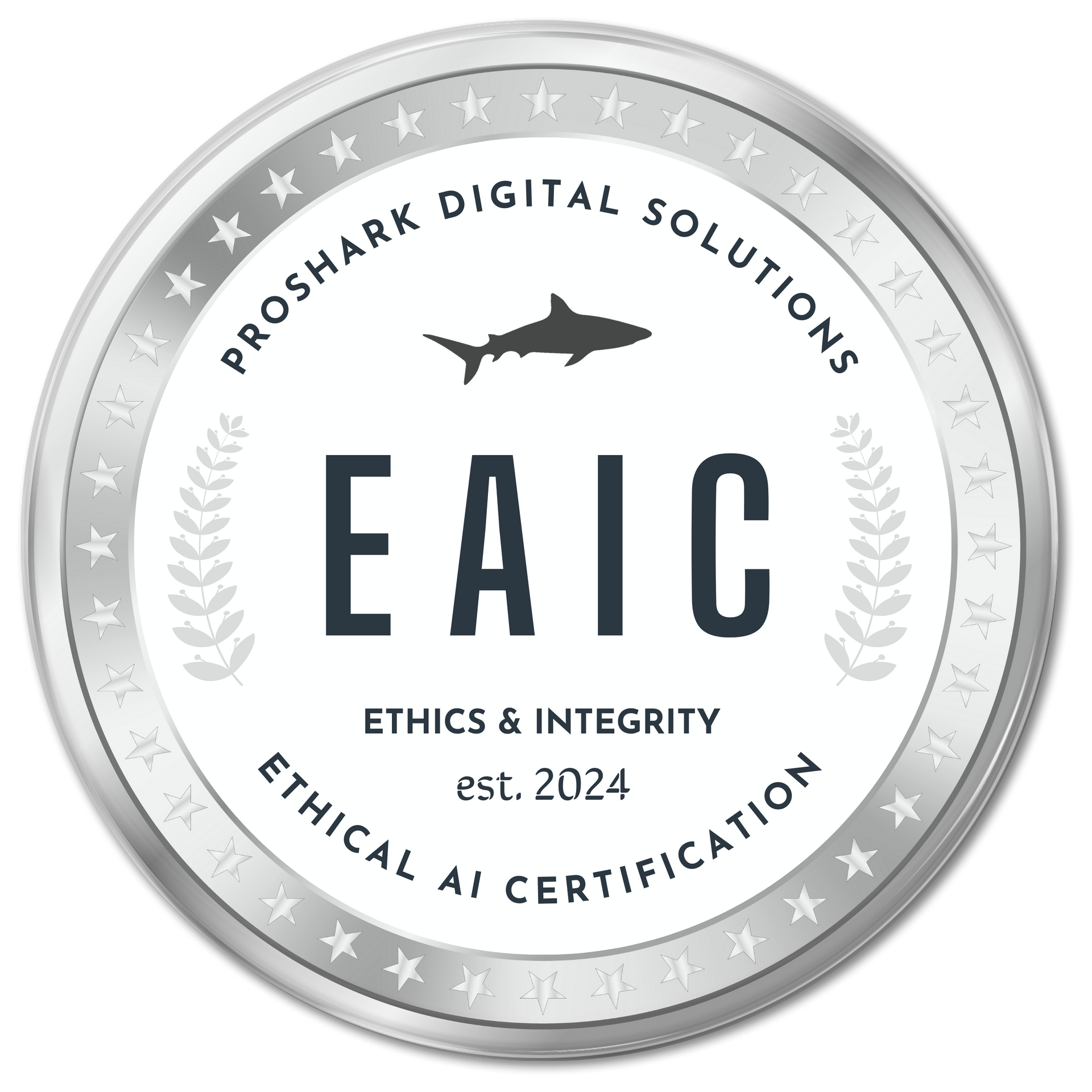Step 2: Learn The Material

Here is what you need to know about AI in today's business world
Understanding Ethical AI
What is Ethical AI?
Ethical AI refers to the fair, transparent, and accountable development and implementation of artificial intelligence systems. The goal is to ensure that AI operates in a way that benefits users without bias, discrimination, or harm.
Core Principles of Ethical AI
Fairness – AI should not favor or discriminate against any individual or group.
Transparency – AI decisions should be understandable and explainable to users.
Accountability – AI developers and businesses should take responsibility for AI outcomes.
The Importance of Transparency
Transparency in AI means that users and stakeholders can understand how decisions are made. Without transparency, AI systems can create unfair outcomes or lead to distrust in their decision-making.
Data Privacy and Security in AI
The Ethics of Data Collection
AI systems rely on vast amounts of data to function effectively. However, data collection must be ethical and responsible. One major concern is that users may not always be aware that their personal information is being collected, stored, and used.
Key Data Protection Regulations
One of the most important data privacy laws is the General Data Protection Regulation (GDPR), which enforces strict rules on how companies collect and use personal data. Companies must obtain user consent before collecting data and allow users to control their information.
What is Informed Consent?
Informed consent means that users actively agree to share their data after being fully informed about how it will be used.
Companies should be clear about:
✔ What data they collect
✔ How the data will be used
✔ Whether the data will be shared with third parties
How Should AI Handle Sensitive Data?
✔ Encrypt and anonymize personal data to protect privacy
✔ Minimize data collection—only gather what’s strictly necessary
✔ Never share data without user consent
Protecting Artists, Authors, and Creators in AI
Why Creators Need Protection
AI models are often trained using vast amounts of digital content, including artwork, music, and literature. If these materials are used without permission, it can result in intellectual property theft, harming artists, writers, and musicians.
How AI Can Ethically Use Copyrighted Content:
✔ Obtain proper licensing and permissions from creators
✔ Use public domain or licensed datasets for AI training
✔ Give credit and compensation to original creators
Understanding Fair Use in AI
Fair use allows limited use of copyrighted material for purposes like:
- Education
- Research
- News reporting
- Commentary or criticism
However, fair use does not mean AI can freely use all copyrighted material—companies must still follow ethical and legal guidelines.
Digital Watermarking: Protecting Content from AI Misuse
Digital watermarking involves embedding visible or invisible markers in digital content to track its use and prevent unauthorized copying. This helps protect artists, photographers, and content creators from AI-related copyright violations.
Accountability and Regulation in AI
The Role of Human Oversight
AI should never operate without human review—especially in areas like healthcare, hiring, and financial decisions. Human oversight ensures that AI systems:
✔ Function fairly and responsibly
✔ Follow legal and ethical guidelines
✔ Are continuously monitored and improved
Why AI Companies Should Be Held Accountable
AI can have real-world consequences, from affecting hiring decisions to determining credit eligibility. Companies developing AI must ensure that their systems are accurate, fair, and free from harm.
Ways to Ensure AI Accountability:
✔ Conduct regular audits and fairness assessments
✔ Maintain clear documentation of AI decision-making processes
✔ Follow government regulations and ethical AI guidelines
The Need for AI Regulation
AI regulations exist to ensure responsible development and prevent harm. Regulations like GDPR and AI-specific policies help ensure that AI is developed and deployed responsibly.
The Future of Ethical AI
What is Explainable AI (XAI)?
Explainable AI (XAI) ensures that AI models can provide clear explanations for their decisions. This is crucial for trust and accountability, particularly in industries like healthcare, finance, and law enforcement.
The Importance of Ethical AI Development
Ethical AI ensures that technology benefits society without causing harm. It’s not just about following rules—it’s about building trust, protecting users, and ensuring AI-driven innovation serves humanity responsibly.
How Developers Can Promote Ethical AI:
✔ Design AI with transparency, fairness, and accountability in mind
✔ Follow ethical guidelines and industry best practices
✔ Involve diverse teams in AI development to reduce bias
The Role of Consumers in Ethical AI
Consumers play a crucial role in demanding transparency and ethical AI practices from businesses.
As AI becomes more integrated into daily life, users should:
✔ Question how AI systems work
✔ Advocate for fair and responsible AI use
✔ Support companies that prioritize ethical AI development
Why Businesses Should Adopt Ethical AI
✔ Builds trust with customers and partners
✔ Reduces legal risks related to data privacy and bias
✔ Enhances brand reputation by demonstrating responsibility
Final Thoughts
AI is shaping the future of technology, but its development must be ethical, transparent, and fair. Businesses, developers, and consumers all have a role to play in ensuring AI enhances lives without causing harm. By following ethical AI principles, companies can build trust, credibility, and long-term success.
Next Up: Review The Study Guide
Now that you know your stuff, its time to review what could be on the test!
All rights reserved © 2004-2024 Proshark • Privacy Policy • Messaging Policy • Terms of Service • Advertising TOU




